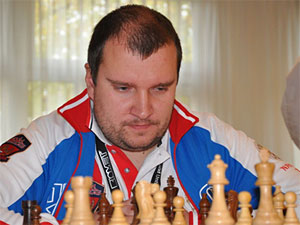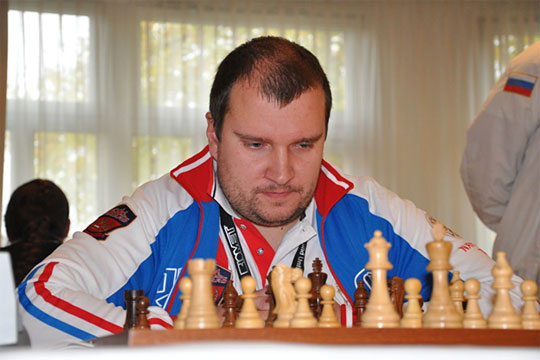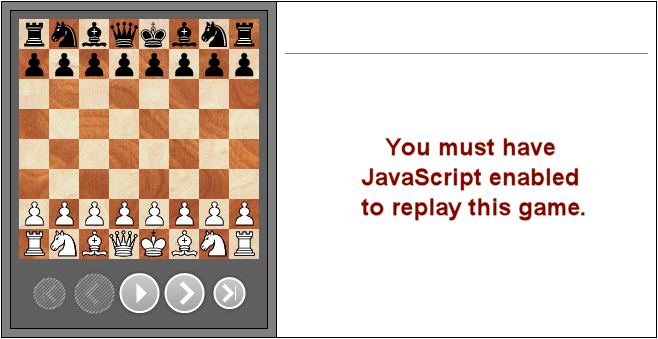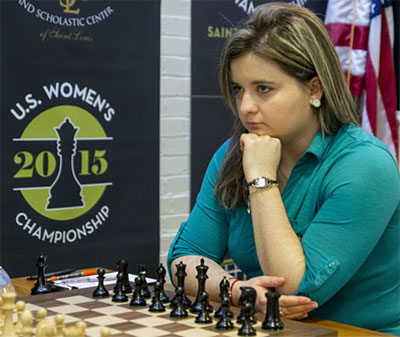



|
Alexey Smirnov wins |
“Winners never quit and quitters never win” – this quote by Vince Lombardi is very apt for each and every participant at the World Disabled Championships 2015 that were held in Dresden, Germany from the 18th to 24th of October 2015. The tournament attracted 63 players from 13 different countries. It was a seven round Swiss event which had an individual tournament, with a separate team ranking. Apart from the title of the World Disabled champion, there were also titles of the winner of braille section, the deaf section and the physically disabled section at stake. In all these categories gold, silver and bronze medals were awarded to the winners.

IM Alexey Smirnov from Russia won the overall event with a score of 6.0/7
Smirnov, who is partially blind, started off the tournament with five wins. Draws in the last two rounds secured him the sole first prize with a score of 6.0/7, half a point ahead of his nearest rivals. The most crucial round was the fifth one in which he took on Stanislav Babarykin. Both the players were on 4.0/4, and the winner would have great chances to claim the title. Alexey Smirnov was tactically alert and managed to win the game.

[Event "World Disabled 2015"] [Site "?"] [Date "2015.10.22"] [Round "5"] [White "Smirnov, Alexey"] [Black "Babarykin, Stanislav"] [Result "1-0"] [WhiteElo "2446"] [BlackElo "2369"] [Annotator "Sagar Shah"] [PlyCount "48"] {Smirnov won the gold medal while Babarykin finished second to claim the silver. Hence the duel between these two players in the fifth round when both of them were on 4.0/4 was especially interesting.} 1. c4 e5 2. d3 Nc6 3. a3 a5 4. Nc3 Nf6 5. Nf3 d5 6. cxd5 Nxd5 7. e3 g6 8. Be2 Bg7 9. Qc2 O-O 10. O-O b6 11. Bd2 Bb7 12. Rac1 Nxc3 13. Bxc3 Qe7 14. Rfd1 Rfd8 15. Rb1 Re8 16. b4 axb4 17. axb4 Rad8 18. b5 {[#] We have a normal position from the reversed Sicilian. White is very comfortable in this position and has just attacked the knight on c6. Babarykin doesn't really have a good square for his knight apart from retreating it to a7 or b8. But he had seen a combination and decided to go for it.} Nd4 $2 {At first sight this looks like a strong move, but it turns out to be a big blunder.} 19. exd4 exd4 20. Bd2 $1 Qxe2 {The bishop had to be taken but now...} 21. Re1 $1 {The queen is trapped.} Bxf3 22. Rxe2 Bxe2 23. f3 {The bishop on e2 cannot be freed easily and White has a clear advantage.} Re5 24. Re1 (24. Qxc7 $16) 24... Ra8 {Black resigned at this point because if White takes the pawn on c7, his position is already quite bad.} 1-0

Stanislav Babarykin lost his game against Smirnov
but scored 5.5 from the remaining
six games to clinch the silver medal
Here is one very nice combination played by Babarykin:
Sergej Wassen – Stanislav Babarykin, round four

White has just played 21.Bb5, attacking the rook on e8. How should Black respond?

[Event "World Disabled 2015"] [Site "?"] [Date "2015.10.21"] [Round "4"] [White "Wassin, Sergej"] [Black "Babarykin, Stanislav"] [Result "0-1"] [WhiteElo "2290"] [BlackElo "2369"] [Annotator "Sagar Shah"] [SetUp "1"] [FEN "4r1k1/pp4p1/3b1q1p/QB1p1p1b/3Pr3/5N2/PP3PPP/4RRK1 b - - 0 21"] [PlyCount "13"] [EventDate "2015.??.??"] {[%csl Re8][%cal Ge2b5,Rb5e8]} 21... Bxf3 $1 {Babarykin was tactically alert and took his chance.} 22. Bxe8 {White has to take the rook but Black has prepared some fireworks in the position.} (22. gxf3 $2 Qh4 $19) 22... Rg4 $1 { One of the many ways to win and also the most thematic.} (22... Bxh2+ 23. Kxh2 Qh4+ 24. Kg1 Rg4 {was also winning.}) 23. Bf7+ Kxf7 (23... Kh7 {is equally good.}) 24. g3 Qh4 $1 {The entire point of the combination. The threat is Qxh2+ followed by Rh4 and Rh1#. At the same time Qh3 is also threatened.} 25. Re5 Bxe5 26. dxe5 Qh3 27. Qc7+ Kg6 {The checks come to an end and White resigned.} 0-1
Speaking of combinations, there is one game played by the bronze medal winner Stanislav Mikheev which includes a nice little trap in the opening:
Piotr Dukaczewski – Stanislav Mikheev, round five

In a normal hedgehog position White just played 9.f4?!
Mikheev was extremely alert
and took full advantage of this careless move by his opponent. Can you find
it?

[Event "World Disabled 2015"] [Site "?"] [Date "2015.10.22"] [Round "5"] [White "Dukaczewski, Piotr"] [Black "Mikheev, Stanislav"] [Result "0-1"] [WhiteElo "2261"] [BlackElo "2296"] [PlyCount "72"] [EventDate "2015.??.??"] 1. Nf3 Nf6 2. c4 c5 3. Nc3 e6 4. e4 Nc6 5. Be2 b6 6. O-O Bb7 7. d4 cxd4 8. Nxd4 d6 9. f4 $6 {A careless move which puts White in grave difficulties right out of the opening.} (9. Be3 $14) 9... Nxd4 $1 10. Qxd4 d5 $1 {[%cal Gf8c5] Mikheev is as alert as ever. The threat of ...Bc5 nets him a pawn.} 11. Qe5 Bd6 12. Qg5 dxe4 {Black has won a crucial pawn and Stanislav's technique was more than adequate.} 13. Be3 (13. Qxg7 $2 Rg8 14. Qh6 Bc5+ 15. Kh1 e3 $1 {[%cal Gb7g2]} 16. Bf3 e2 $1 17. Nxe2 Bxf3 18. gxf3 (18. Rxf3 Qd1+ $19) 18... Qd3 $1 $19 {The position is completely lost.}) 13... O-O 14. Rad1 h6 15. Qg3 Qe7 16. a3 Bc5 17. b4 Bxe3+ 18. Qxe3 Rfd8 19. Rc1 Rac8 20. h3 Rd7 21. Rc2 Rcd8 22. Nb5 Bc6 23. Nc3 Qd6 24. Rd1 Qb8 25. Ra1 Rd4 26. a4 e5 $1 27. f5 Qd6 28. c5 bxc5 29. Nb5 Qd7 30. Rxc5 Nd5 31. Qg3 Nf4 32. Bg4 Bxb5 33. Rxe5 (33. Rxb5 Rd3 34. Qe1 Qd4+ 35. Kh1 h5 $19) 33... Ne2+ 34. Bxe2 Bxe2 35. b5 Rd3 36. Qh4 Qd4+ 0-1

IM Piotr Dukaczewski is a living legend. He has been four times blind world champion and ten times Polish National Blind champion. He has won Poland a medal at the Olympiad on four occasions – a Gold in the year 2004. Apart from that he serves as president of the Association of Physical Culture Sports and Tourism of the Blind and Partially Sighted, "Cross", and Vice President of the International Chess Federation of the Blind. He is also a board member of Polish Paralympic Committee.

World Champion Alexey Smirnov with his three
gold medals:
overall disabled world champion, best team and best blind player

The top three medal winners: Gold – Alexey Smirnov of Russia (center), Silver – Stanislav Babarykin (left), Bronze – Stanislav Mikheev (right) are flanked by Zbigniew Pilimon, IPCA President (extreme left) and Lakhdar Mazouz, advisor to the FIDE President for chess development in Africa (extreme right).

Best teams: IBCA from Russia in the background (gold), Ukrainian team (silver) and IPCA from Russia (bronze)

Aleksandra Aleksandrova from Israel was adjudged
best woman player in the tournament. She scored 4.5/7.

Winners of the International Braille Chess
Association (IBCA) 2015 are greeted by GM Thomas Luther.
Gold – Alexey Smirnov (Russia), Silver – Stanislav Babrykin
(Russia), Bronze – Yuri Meshkov (Russia)

Winners of International Chess Committee of
the Deaf (ICCD) 2015: Gold – Vladimir
Kovalenko (Ukraine), Silver – Tomasz Miozga (Poland), Bronze –
Balazs Mate (Hungary)

Winners of the International Physically Disabled
Chess Association (IPCA) 2015:
Gold – Stanislav Mikheev (Russia), Silver – Andrei Gurbanov
(Israel), Bronze – Igor Yarmanov (Ukraine)

The tournament was held in the beautiful Wyndham Garden Hotel

Little kids holding the flags of the participating players from different nations

Dr. Dirk Jordan, the director of the tournament, who ensured that each and every need of the participants would be fulfilled, and the players would experience high class facilities which would enable them to focus on their games. With his enthusiasm and unending energy he is leading a powerful team of nearly 100 smart working chess lovers in the city of Dresden.

Here is one example of how the organizers tried to assist the players in the best way they could. Shailesh Nerlikar (seen in the picture above) suffers from 100% disability. The organizers provided him with an assistant for all the games to make the moves that he would call out. You will know more about Shailesh in an exclusive article soon to be published on our news page.

Snehit Saraf was given a small desk where he could keep his personal chess set and execute the moves

Sergey Tsapalin with his caretaker

The media coverage was also excellent. In the
picture you can see the crew
from Mitteldeutscher
Rundfunk (MDR) recording a short video.

Egmont Pönisch (right) was the chief arbiter. Apart from doing a commendable job in the event, he also organized the first FIDE course for arbiters especially designated for the needs of the disabled chess players.

German GM Thomas Luther visited the event on
its first day.'
He is the head of the FIDE Commission for the disabled and has done important
work.

WGM Sabina Foisor did some exceptional work at the tournament. She not only annotated top ten boards of every round but also made a video on the best game of the day. Here’s the round seven video:
Annotated video of other top games

Lakhdar Mazouz of Algeria, advisor to the FIDE President for chess development in Africa, was present at the closing ceremony. He pointed out that the organization of such championships for disabled players is an immense step forward in development of chess, not only for disabled players, but for all other chess fans in general.

Bharat Singh, the CEO of All India Chess Federation
and the chairman of the
FIDE technical commission, inaugurates the round by making the first move

Yvonne Ledfuss, the PR officer of the ZMDI chess festival and tournament manager of the WCCD 2015

Organizing such an event without a good team is an impossible task!

All the pictures in this report were taken by Karsten Wieland. Dressed in jeans and green polo shirt, for the first 15 minutes in every round he worked as a photographer. Then he would change into a black suit and become an arbiter, where he would solve problems faced by the participants.
The 2015 World disabled Championships was truly a congregation of the most courageous chess players from all over the world. Players suffering from various disabilities travelled thousands of kilometers to play the game of chess with each other. It just shows how powerful and special chess really is. It has the ability to change one’s life for the better. Dresden and Dr. Dirk Jordan did a phenomenal work of organizing the event in 2013 and 2015. The city would be organizing the 2017 edition as well.
There has been a huge debate whether separate titles (WIM/WGM) should be kept for the women players. Whether we should keep these titles or not is a completely different topic of debate. But if women players have easier rules for achieving their titles, it definitely makes sense to have less strenuous title requirements for the disabled people. They are surely at a disadvantage as compared to a normal player. Every disabled chess player above a certain percentage of disability can make his GM title if he achieves, say, a rating of 2300. The specifics can be decided by a special committee of FIDE. But I definitely think that this would be a positive step forward.
Pictures by Karsten Wieland
LinksYou can use ChessBase or any of our Fritz compatible chess programs to replay the games in PGN. You can also download our free Playchess client, which will in addition give you immediate access to the chess server Playchess.com. |